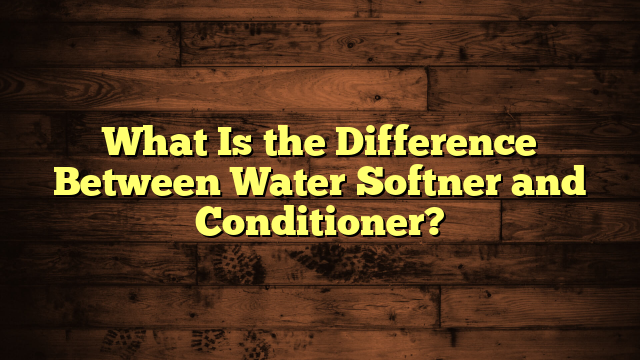Can You Drink Water After a Water Softner?
Imagine a glass of crystal-clear water, glistening in the sunlight, promising refreshment after a long day. You might wonder, though, if that water is safe to drink after it's passed through a water softener. While softened water can enhance your plumbing and appliances, it also carries nuances, particularly regarding sodium content. For those mindful of their salt intake, this raises important questions. What are the implications for your health, and are there alternatives worth considering? Let's explore these aspects further.
Key Takeaways
- Yes, you can drink water after it has been softened; it is generally safe for consumption.
- Softened water contains sodium, which may raise blood pressure; monitor intake if on a low-sodium diet.
- Potassium-based water softeners are available, providing a low-sodium alternative for hydration.
- Taste may differ due to sodium content; consider testing and refrigerating softened water for improved flavor.
- Regular water testing ensures safety, detects contaminants, and assesses the effectiveness of your water softener.
How Water Softeners Work
Water softeners are essential devices that tackle hard water issues in your home. They work by using a process called ion exchange, which effectively reduces the mineral content in your water. Hard water typically contains high levels of calcium and magnesium, which can lead to scale buildup in pipes and appliances.
When you install a water softener, it replaces these hard minerals with sodium or potassium ions, making the water softer and more manageable.
The system usually includes a resin tank filled with tiny beads that attract and hold the calcium and magnesium ions. As hard water flows through the tank, these minerals adhere to the beads, leaving behind softened water.
After a while, the beads become saturated, and the softener needs to regenerate. This process involves flushing the beads with a salt solution, allowing them to release the hard minerals and recharge with sodium ions.
It's important to note that while water softeners improve water quality, they're not a complete water filtration system. If you're concerned about contaminants, consider pairing your water softener with a dedicated filtration system to guarantee your drinking water is clean and safe.
Benefits of Softened Water
Enjoying the benefits of softened water can greatly enhance your daily life. One of the most notable softened water benefits is its positive impact on your skin. When you wash with softened water, you'll likely notice that your skin feels smoother and more hydrated. This is because softened water contains fewer minerals that can cause dryness and irritation, allowing your natural oils to thrive.
Additionally, softened water can improve the effectiveness of soaps and shampoos. You may find that you need less soap to achieve a good lather, which means you're not only saving money but also reducing the chemicals that can irritate your skin. Your hair might also feel softer and more manageable, giving you that fresh, salon-quality look at home.
Moreover, using softened water can help reduce soap scum and mineral buildup in your appliances and plumbing, prolonging their lifespan. This can save you time and money on repairs down the line.
Sodium and Potassium Levels
When you use a water softener, it's important to reflect on how sodium levels in your drinking water might change.
Many softeners replace hard minerals with sodium, which can impact your health, especially if you're on a low-sodium diet.
Fortunately, there are potassium-based alternatives available that can soften your water without the added sodium, so let's explore these options and their implications.
Sodium in Softened Water
Softened water can greatly impact your sodium and potassium intake, raising significant considerations for your health. When water is softened, sodium ions replace the calcium and magnesium ions typically found in hard water. This process can lead to increased sodium levels in your drinking water, which can be a concern if you're monitoring your sodium sources for health reasons.
If you're on a low-sodium diet or trying to achieve sodium reduction, it's important to evaluate how much sodium your softened water contributes to your daily intake. Depending on the system used, the sodium content in softened water can vary greatly, sometimes adding as much as 200 milligrams per liter. For those who consume additional sodium from processed foods or other beverages, this can quickly add up.
Moreover, if you're concerned about hypertension or heart health, it's crucial to be aware of these levels. While softened water offers benefits, such as improved taste and reduced scale buildup in appliances, monitoring your sodium intake is vital.
You might want to consult with a healthcare provider to assess your specific needs and make informed decisions about your water consumption.
Potassium Alternatives Available
If you're looking for alternatives to sodium-based water softeners, potassium chloride can be an effective choice. This mineral not only softens your water but also adds potassium, which is essential for various bodily functions.
Unlike sodium, potassium chloride won't contribute to increased sodium levels in your drinking water, making it a suitable option for those monitoring their sodium intake.
Another alternative you might consider is potassium bicarbonate. This compound not only softens water but also raises the pH level, making it slightly alkaline.
This can be beneficial for your health, as alkaline water is often associated with various health benefits, including improved hydration and better mineral absorption.
When opting for potassium-based solutions, keep in mind that they can be more expensive than traditional sodium methods.
However, the health benefits and the positive impact on your plumbing and appliances can outweigh the costs.
If you decide to switch to potassium chloride or potassium bicarbonate, just be aware of the differences in how they function compared to sodium.
This knowledge helps you make an informed decision that best suits your needs and lifestyle.
Health Implications Explained
Understanding the health implications of sodium and potassium levels in your drinking water is essential for making informed choices. When water is softened, sodium is often added to replace hard minerals like calcium and magnesium. If you're on a sodium-restricted diet, this could pose health risks. Elevated sodium levels may lead to increased blood pressure and other cardiovascular issues, so be mindful of your daily intake.
On the other hand, potassium is a beneficial mineral that supports hydration benefits and overall health. If your water softener uses potassium chloride instead of sodium chloride, you might enjoy better mineral absorption, contributing to a balanced diet.
However, excessive potassium can also be harmful, particularly for individuals with kidney issues.
To guarantee you're making the best choices, consider testing your water for sodium and potassium levels. You can also explore alternative water softening methods that minimize sodium while still providing the benefits of soft water.
Health Concerns of Softened Water
Many people wonder about the health implications of drinking softened water, especially since it undergoes a process that alters its mineral content. Softened water is treated to remove calcium and magnesium, replacing them with sodium or potassium ions. While this change can improve taste and reduce scale buildup, it raises some health concerns.
One significant issue is sodium content. If you're on a low-sodium diet for health reasons, drinking softened water could contribute to your daily sodium intake more than you might expect. The health effects can vary depending on how much softened water you consume and your overall dietary sodium levels.
Another concern is the reduced presence of beneficial minerals like calcium and magnesium. Although these minerals are often consumed through food, relying solely on softened water might limit your intake over time.
Ultimately, understanding these health concerns can help you make informed choices. It's wise to consult with a healthcare provider if you have specific health conditions or dietary restrictions.
Comparing Softened and Hard Water
When it comes to choosing between softened and hard water, it's important to recognize the key differences that can impact both health and household needs.
Hard water is rich in minerals like calcium and magnesium. While these minerals can be beneficial, they can also lead to scale buildup in your pipes and appliances, reducing their efficiency and lifespan. If you've ever noticed a white crust on your faucets, that's a sign of hard water.
On the other hand, softened water has had these minerals replaced with sodium or potassium. This process not only prevents scale buildup but also makes soap and detergents more effective, leading to cleaner laundry and dishes.
However, the change in mineral content can affect taste and health, especially for those on sodium-restricted diets.
Both types of water have their pros and cons, depending on your needs. If you prioritize cleaner appliances and easier cleaning, softened water might be the way to go.
But if you're more concerned about the mineral content and its potential health benefits, hard water could be preferable.
Ultimately, understanding these differences will help you make an informed decision that suits your lifestyle.
Recommendations for Drinking Water
When using a water softener, it's important to take into account how sodium levels can affect your health, especially if you have specific dietary restrictions.
You'll also want to reflect on the taste and quality of the softened water, as these factors can influence your overall hydration experience.
Let's explore the best practices for drinking water after softening, so you can guarantee it meets your needs.
Sodium Levels Consideration
One important consideration after installing a water softener is the sodium levels in your drinking water. Water softeners typically replace calcium and magnesium ions with sodium ions, which can increase the sodium content in your water. This is especially important if you're monitoring your sodium intake for health reasons.
To help you understand the implications, consider the table below:
| Sodium Content (mg/L) | Daily Consumption (Liters) | Total Sodium Intake (mg) |
|---|---|---|
| 50 | 2 | 100 |
| 100 | 2 | 200 |
| 150 | 2 | 300 |
If you consume two liters of softened water daily, the total sodium intake can vary considerably. High sodium levels can have health effects, especially for those with hypertension or heart conditions. It's advisable to test your water for sodium content and consult with a healthcare professional regarding safe consumption levels. By being aware of the sodium levels, you can make informed decisions about your drinking water and maintain a healthy lifestyle.
Health Impacts Overview
Reflecting on the potential health impacts, it's important to assess the quality of your drinking water after installing a water softener.
Water softeners typically replace calcium and magnesium with sodium, which can influence your hydration benefits. While soft water is gentler on plumbing and appliances, it's significant to evaluate how this change affects your body's hydration and mineral absorption.
If you're concerned about sodium intake, you might want to use a separate filtration system for your drinking water. This guarantees you're getting the minerals your body needs while still enjoying the convenience of softened water for other household uses.
Remember, proper hydration is crucial for overall health, and drinking water should ideally contain necessary minerals to support bodily functions.
You should also monitor your body's response to softened water. Some people may notice changes in how they feel or their hydration levels.
By being proactive about your water quality, you can make sure you're making the best choices for your health while still enjoying the benefits of a water softener.
Always consult with a healthcare professional if you have specific concerns regarding your water quality and health.
Taste and Quality Factors
After installing a water softener, you might notice a change in the taste and quality of your drinking water. This shift can impact your taste preferences and quality perception, making it essential to understand what to expect.
While softened water often feels smoother, some people find the sodium levels can alter the taste.
Here are some recommendations to enhance your drinking experience:
- Taste Test: Try comparing softened water to unsoftened water to gauge your preference. You might discover subtle differences that matter to you.
- Chill It: Cold water can mask some flavors. Refrigerating your softened water may help improve its taste and make it more invigorating.
- Use a Filter: If the taste still doesn't sit well with you, consider using a water filter. This can further refine the quality and remove any lingering saltiness.
Ultimately, trust your palate. If you enjoy the taste and feel confident about the quality, then your water softener is doing its job.
Alternatives to Softened Water
If you're looking for alternatives to softened water, several options can meet your needs without relying on traditional water softeners.
One popular softened alternative is a salt-free water conditioner. These systems use a process called template-assisted crystallization, which helps prevent scale buildup without removing minerals. This way, you maintain healthy mineral content while keeping your pipes and appliances protected.
Another option is water filtration. Filtration systems can remove impurities and contaminants, offering clean water without the drawbacks of softening. Activated carbon filters, for instance, improve taste and odor, while reverse osmosis systems eliminate a broader range of impurities.
These filtration methods can also help you retain essential minerals that are often stripped away by softening processes.
Additionally, consider using a whole-house filtration system, which treats all the water entering your home. This can provide you with high-quality water for drinking, cooking, and bathing.
Each of these softened alternatives provides a viable solution, ensuring that you can enjoy clean, mineral-rich water without the downsides of traditional water softeners.
Testing Your Water Quality
Testing your water quality is essential for ensuring the safety and health of your household.
After installing a water softener, it's important to conduct regular water testing to assess whether your drinking water meets safety standards. This quality assessment helps you identify any potential contaminants or imbalances that could affect your health.
Here are three key reasons to test your water:
- Detect contaminants: Regular testing can reveal harmful substances like lead, bacteria, or pesticides in your water.
- Monitor hardness levels: Even after softening, you should check if the water remains within acceptable hardness ranges to avoid scaling and plumbing issues.
- Ensure softener efficiency: Testing helps you determine if your water softener is functioning correctly, providing peace of mind that you're getting the best quality water.
Frequently Asked Questions
Can Softened Water Be Used for Cooking?
You can use softened water for cooking, but be mindful of health considerations. The sodium content might not suit everyone, particularly those on low-sodium diets. Always check with your doctor if you're unsure.
How Often Should I Maintain My Water Softener?
"An ounce of prevention's worth a pound of cure." You should check your water softener maintenance every few months. Regular upkeep boosts softener efficiency, ensuring it operates effectively and prolongs its lifespan.
Does Softened Water Affect Laundry Detergents?
Softened water can enhance detergent effectiveness, making laundry maintenance easier. It reduces mineral buildup in fabrics, ensuring detergents work more efficiently. So, you'll likely notice cleaner clothes and less residue after each wash.
Can Pets Drink Softened Water?
Ever wondered if your furry friend can enjoy the same softened water benefits you do? While softened water aids pet hydration, it's best to consult your vet, as sodium levels might not suit every pet's needs.
Is There a Difference in Taste Between Softened and Hard Water?
You might notice a difference in taste between softened and hard water. Many people prefer the smoother texture of softened water, appreciating its benefits like reduced scaling in appliances, which can enhance overall drinking experiences.
Conclusion
To summarize, drinking water from a softener can be safe, but it's crucial to know the sodium content, especially if you're watching your intake. Think of softened water as a double-edged sword: while it provides benefits like smoother skin and cleaner dishes, it may not suit everyone's health needs. Always test your water, consider alternatives if necessary, and consult with a healthcare provider for peace of mind. Your health deserves clarity, just like your water!







